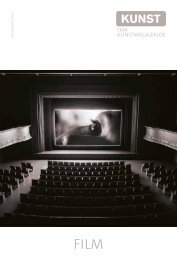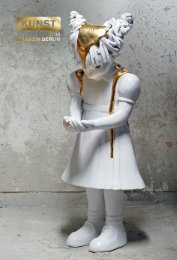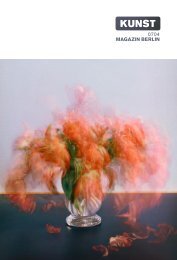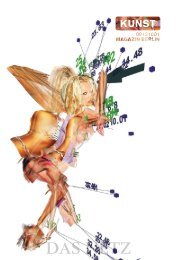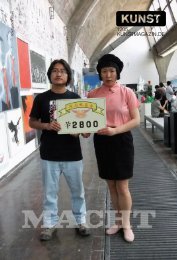Download als .pdf - KUNST Magazin
Download als .pdf - KUNST Magazin
Download als .pdf - KUNST Magazin
Erfolgreiche ePaper selbst erstellen
Machen Sie aus Ihren PDF Publikationen ein blätterbares Flipbook mit unserer einzigartigen Google optimierten e-Paper Software.
Entwicklungen zu beobachten. Die Gesamtsituation hat<br />
sich politisch allerdings seit 2009 derartig verschlechtert<br />
– man kann ja durchaus davon sprechen, dass Putin<br />
dabei ist, scheibchenweise eine Diktatur zu installieren –,<br />
dass das natürlich auch starke Auswirkungen auf die<br />
Kunstszene hat. Die Atmosphäre für eine blühende oder<br />
sich frei entwickelnde Kultur wird erstickt. Viele Menschen,<br />
die im Moment in Russland Geld verdienen, sind<br />
so unter Druck geraten, dass sie entweder ausreisen<br />
oder im Gefängnis sind und ihr Geld sowieso im Ausland<br />
deponieren. Dadurch kaufen russische Sammler eher<br />
in London, St. Moritz oder New York zeitgenössische<br />
Kunst <strong>als</strong> in Moskau. Diese Atmosphäre, die durch eine<br />
unglaubliche Korruption entstanden ist, legt sich auf<br />
alles wie ein Nebel, der die Menschen stark ausbremst.<br />
Das wird dann zugedeckt mit Geld, Glamour, Party, mit<br />
schönen Frauen und Autos, großen Häusern und Luxus,<br />
aber wenn man da mal ein bisschen an der Oberfläche<br />
kratzt, ist der schöne Schein sofort weg und drunter<br />
stinkt es gewaltig. Die Entwicklungen bis 2005, 2006<br />
hatten den Ausschlag für mich gegeben, eine Galerie zu<br />
eröffnen: Viele jüngere Sammler hatten sehr euphorisch<br />
angefangen zeitgenössische Kunst zu sammeln. Es gab<br />
z. B. auf einmal Stiftungen wie die Ekaterina Foundation,<br />
das Museum Igor Markin und die Stella Art Foundation<br />
– derzeit kommissarisch für den russischen Pavillon in<br />
Venedig verantwortlich. Da gab es Dasha Zhukova <strong>als</strong><br />
treibende Kraft hinter der „Garage“; 2005 fand die erste<br />
Biennale in Moskau statt – überall ist etwas passiert.<br />
Olga Sviblova bekam einen sehr schönen neuen Museumsbau,<br />
das MAMM – das Museum für Kunst und neue<br />
Medien. Ich selber hatte dann ja auch ein paar sehr gute<br />
Monate, aber das Timing war einfach schlecht. Im April<br />
2008 eröffnete ich mit einer Jenny-Holzer-Ausstellung,<br />
das Feedback war überwältigend. Aber ich war dennoch<br />
etwas skeptisch, so etwas kannte ich gar nicht. Der Tiefschlag<br />
kam dann mit dem Kaukasus-Krieg im August, da<br />
flossen quasi 20% des Kapit<strong>als</strong> ab. Und vier Wochen später<br />
dann die Lehman-Brothers-Pleite. Das war eine Woche,<br />
die war der Wahnsinn: am Montag Damien Hirst in<br />
London und die Pleite von Lehman Brothers, am Dienstag<br />
fand in Moskau die Eröffnung der Garage mit einer<br />
Retrospektive des Künstlerpaars Ilya und Emilia Kabakov<br />
statt und am Mittwoch eine Pop-up-Eröffnung von<br />
Gagosian, ich habe dann am Donnerstag Wim Delvoye<br />
eröffnet. Aber da lief schon nichts mehr. Bis Dezember<br />
fiel die Börse um 80% und der russische Rubel um 30%.<br />
Von April bis August war alles unglaublich, und dann<br />
war aber auch schlagartig alles vorbei. Als ob man zu<br />
lange getrunken hätte, zu spät ins Bett gegangen und<br />
dann mit einem Riesenkater aufgewacht wäre.<br />
Wie verkraftet man so eine historische Krise?<br />
Ich habe sehr schlechte Zeiten erlebt – fast vier Jahre<br />
wirtschaftlicher Depression mit meiner Galerie. Ich hatte<br />
meine Liquidität verloren, alles was ich hatte. Das lag<br />
aber natürlich auch daran, dass es hier ähnlich schlecht<br />
lief. Ich habe versucht, überall zu sparen und wieder<br />
since 2009 has become so appalling—it is entirely<br />
appro priate to speak of Putin as someone who is now<br />
slowly installing himself as a dictator—and that obviously<br />
has strong implications for the art scene. The<br />
atmosphere for a burgeoning or freely developing or<br />
even a distinguished culture is being constricted. Many<br />
of those who are now earning their money in Russia<br />
are under so much pressure that they either leave the<br />
country or wind up in jail—and, in any case, they deposit<br />
their money in foreign countries. Thus Russian collectors<br />
prefer to buy contemporary art in London, St. Moritz or<br />
New York rather than in Moscow. This atmosphere that<br />
has arisen under such incredible corruption has spread<br />
itself over everything else like a fog that makes the people<br />
there feel thwarted. This is then glossed over with<br />
money, glamour, and parties with beautiful women and<br />
cars and large houses and luxury. But if you scratch a little<br />
at the surface, the beautiful mirage disappears, and<br />
underneath it lies a foul odour. The developments up to<br />
2005 and 2006 were among my reasons for opening a<br />
gallery there. Many young collectors had begun to collect<br />
conmteporary art euphorically. Suddenly there were<br />
foundations like, for instance, the Ekaterina Foundation,<br />
the Museum Igor Markin and the Stella Art Foundation,<br />
which is currently responsible for the Russian Pavilion<br />
in Venice. There was Dasha Zhukova as the driving<br />
force behind the “Garage”. In 2005, the first Biennale in<br />
Moscow took place. Everywhere, something was happening.<br />
Olga Sviblova has taken charge of a very attractive<br />
new museum building: the MAMM (Multimedia Art<br />
Museum Moscow). I myself <strong>als</strong>o had a few good months<br />
there, but the timing was simply bad. In April of 2008 I<br />
opened the gallery with a Jenny Holzer show. The feedback<br />
was overwhelming. But I still remained somewhat<br />
sceptical. I’d never known anything like it before. The<br />
blow below the belt came with the Caucasus War in<br />
August. About 20% of the capital was gone. Four weeks<br />
later, the Lehman Brothers declared bankruptcy. That<br />
week was crazy. On Monday, Damien Hirst in London<br />
and the Lehman bankruptcy; on Tuesday, the Garage<br />
opened with a retrospective on the artist-couple Ilya<br />
and Emilia Kabakov; on Wednesday there was the Pop-<br />
Up opening at the Gagosian, I had opened with Wim<br />
Delvoye on Thursday, but, after that, nothing worked.<br />
By December the stock market had fallen by 80% and<br />
the Russian Rubel by 30%. From April to August things<br />
there were incredible. But then, suddenly, everything<br />
was over. As if everyone had been drinking too long, had<br />
gone to bed too late, and had woken up with an enormous<br />
hangover.<br />
How does one deal with such a historical crisis?<br />
I’ve been through very tough times: four years of financial<br />
depression with my gallery. I’d lost my liquidity<br />
and everything I had. But of course that was <strong>als</strong>o due to<br />
the fact that things here were going poorly, too. I tried<br />
to economise wherever I could and to settle down. But<br />
unfortunately, that took me several years. But I’m the<br />
Installationsansicht Zhang Huan: Paintings and Sculptures, DIEHL Moskau, 28.11.2008–25.1.2009<br />
runterzukommen. Das hat einfach leider mehrere Jahre<br />
gedauert. Aber ich bin ein Mensch, der versucht, solche<br />
Ereignisse <strong>als</strong> Herausforderung zu sehen. Ich würde sogar<br />
so weit gehen zu behaupten, dass es für mich persönlich<br />
richtig und lehrreich war, weil es mich wieder<br />
auf das zurückgeworfen hat, was ich eigentlich bin, will<br />
und kann. Seit meinem 14. Lebensjahr wollte ich immer<br />
mit Kunst zu tun haben und habe auch nie etwas anderes<br />
gemacht, <strong>als</strong> mich mit Kunst zu beschäftigen. Ich<br />
dachte auch nicht, dass es die Schuld der Kunst ist, was<br />
da mit mir passierte. Als Erkenntnisprozess hatte die<br />
Erfahrung aber eigentlich etwas sehr Positives, weil ich<br />
heute besser weiß <strong>als</strong> vor vier, fünf Jahren, was ich wirklich<br />
möchte. Wenn man in so einem Business steckt,<br />
kann es schnell passieren, dass man sich was vormacht.<br />
Man macht Dinge, weil man denkt, man müsste sie tun,<br />
um “erfolgreich“ zu sein. Man beginnt, Kompromisse<br />
mit sich selbst auszuhandeln, und entfernt sich immer<br />
mehr von dem, was man anfangs mal wollte. Ich hatte<br />
wirklich ernste Probleme, und ich bin zum Glück gerade<br />
mal auf dem Weg einer erkennbaren Besserung. Aber<br />
wenn ich jetzt so zurückblicke, kann ich das inzwischen<br />
<strong>als</strong> einen wichtigen Teil meiner Karriere akzeptieren.<br />
type of guy who tries to see such events as challenges.<br />
I would even maintain that it was personally good and<br />
instructive for me because it forced me to return again<br />
to who I actually am and what I can achieve. Ever since I<br />
was fourteen I’ve wanted to be involved in art and I never<br />
did anything else. I didn’t think that art was at fault<br />
for what happened to me. As a learning process, the experience<br />
had something very positive about it because<br />
today I know better than I did four or five years ago<br />
what I want. When you’re involved in the business, pretty<br />
soon you can start deceiving yourself. You do things<br />
because you think you have to in order to be successful.<br />
You begin to make compromises with yourself and you<br />
slowly distance yourself more and more from what you<br />
originally wanted. I really had serious problems; right<br />
now I’m fortunately on the road to an appreciable recovery.<br />
But when I look back at it all, now I can accept it as<br />
an important part of my career.<br />
For a year and a half you exhibited art in Moscow; and<br />
in 2010 you even organised an art fair there.<br />
The COSMOSCOW was a wonderful event. It was a lot of<br />
fun. I initiated it together with the owner of the Regina<br />
Gallery, Vladimir Owtscharenko and the collector Margarita<br />
Pushkina, and our concept was a stroke of genius.<br />
14<br />
15



